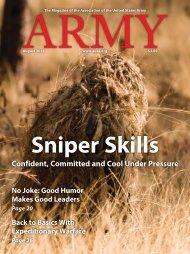All About - History - Hitler Versus Stain
All About History offers a energizing and entertaining alternative to the academic style of existing titles. The key focus of All About History is to tell the wonderful, fascinating and engrossing stories that make up the world’s history.
All About History offers a energizing and entertaining alternative to the academic style of existing titles. The key focus of All About History is to tell the wonderful, fascinating and engrossing stories that make up the world’s history.
Create successful ePaper yourself
Turn your PDF publications into a flip-book with our unique Google optimized e-Paper software.
Born to a bear trainer and an actress in<br />
Constantinople, the woman fated to become<br />
the wife of a Byzantine emperor hardly had<br />
an auspicious start in life. In Theodora’s<br />
early years her life took a path that her later<br />
detractors would revel in, providing effortless fuel<br />
for the gossip that would surround her even after<br />
death. For there is little doubt that Theodora had<br />
two intertwined and equally suspect occupations<br />
before her marriage: she was well known both as<br />
an actress and as a courtesan. This line of work was<br />
also taken by at least one of her two sisters, and it<br />
is said that her mother ushered the girls into their<br />
professions after the death of their father, Acacius.<br />
John of Ephesus, a writer sympathetic towards<br />
Theodora, refers to her as having come “from<br />
the brothel”, while the less friendly Procopius,<br />
whose writings are our largest single source of<br />
information on Theodora, also repeats this detail.<br />
From Procopius, we learn that the young Theodora<br />
made quite a name for herself: with her provocative<br />
dress and habit of stripping on stage, she titillated<br />
her audiences, even allowing buckets of grain to<br />
be emptied between her legs for geese to peck out.<br />
When the performances were over, Theodora went<br />
further still and offered herself to all, both high and<br />
low, attending banquets to drum up custom.<br />
However true or not the worst exaggerations of<br />
Procopius, this was not a life that would do for one<br />
such as Theodora. Early on it became apparent<br />
that she was intelligent, resourceful and able to<br />
think for herself, traits that would serve her well. At<br />
16, Theodora left Constantinople for North Africa,<br />
where she spent four years in the role as mistress<br />
to Hecebolius, a Syrian official. The whole matter<br />
ended in tears, but this did not bring her down; on<br />
her slow return to Constantinople via Alexandria<br />
and Antioch, Theodora met patriarchs and others<br />
of influence, learning and honing the skills and<br />
manners that she displayed to such great effect as<br />
empress. It was during this time that she is said to<br />
have converted to the controversial Monophysite<br />
religion, which held the belief that the human and<br />
divine natures of Christ were fused into one.<br />
Setting her former occupations behind her,<br />
in 522, in her early 20s, Theodora returned to<br />
Constantinople. She set herself up as a wool<br />
spinner, making her home close to the palace. Here<br />
she caught the eye of Justinian – heir and nephew<br />
to Emperor Justin I. The middle-aged Justinian<br />
was captivated by her, and was determined to<br />
marry Theodora: but there was one, apparently<br />
insurmountable, obstacle. An old law stated<br />
that government officials were prohibited from<br />
marrying actresses, and although Theodora had<br />
renounced her previous role, her dalliance with the<br />
stage now barred her from becoming the wife of<br />
the man who was heir to the empire. To further


















